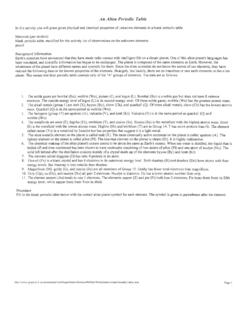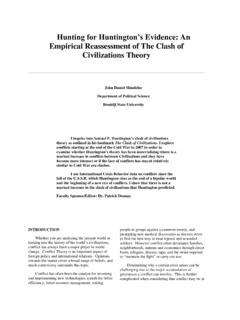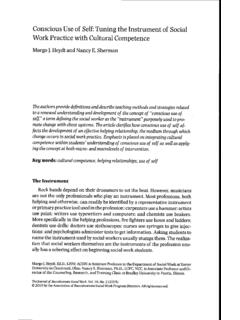Transcription of Guide for Developing an Internship Learning Goals Plan
1 Bemidji State University social Work Department | Internship Learning Contract Guide 1 Guide for Developing an Internship Learning Goals Plan What is a Learning Goals Plan? The Learning Goals Plan is a Guide to direct and monitor the student s Learning and the field instructor s teaching. It is a joint process and negotiated agreement between the student, the field instructor, and the faculty liaison who leads the seminar. It identifies the process and content of student Learning . Why develop a Learning Goals Plan? The Learning Goals Plan provides structure and guidelines for the Learning in the field placement. It helps to identify and define the following: What the student needs and wants to learn What Learning activities/tasks/strategies will be used to meet the student s Learning objectives How the student s Learning and accomplishments will be monitored and evaluated The instructional/supervisory meeting times and process of instruction/supervision Identification of the roles and responsibilities of all those involved in the student s Learning , including the student How do I prepare for the Learning Goals Plan?
2 Student responsibilities: Review the course objectives for SOWK 4970: Internship Review the mid-term and final evaluation forms for the field placement to determine what criteria will be used to evaluate your performance Reflect on your Learning style Identify your expectations of field instruction/supervision and how to communicate them Reflect on how you communicate, deal with feedback, deal with authority, engage is self-directed Learning , deal with conflict Reflect on how you would make best use of supervision. Bemidji State University social Work Department Internship Learning Contract Field Instructor s responsibilities: Review the course objectives for SOWK 4970 Review the BSU expectations for field instructors and field settings Identify what Learning opportunities exist in the field setting Identify and prepare colleagues who may be involved in the field instruction activities Reflect on personal expectations of the student and of yourself Reflect on your teaching style and how you will communicate this to the student Reflect on your ability to negotiate General Purpose of the Learning Goals Plan A roadmap for the development of the Internship experience.
3 An opportunity for the student and field instructor to discuss expectations, individual Learning and teaching styles, strengths and challenges, how to manage conflict Determines structure of supervisory sessions such as dates and times, length of sessions and who will determine agenda Placement hours, who keeps record, what to do if unable to attend placement, etc. Considerations There is considerable anxiety associated with this process Learning plans are negotiated; sometimes there are restrictions on what activities are appropriate for students The field instructor must be mindful of the power dynamics Learning plans are evolving and should be renegotiated. Learning Goals Plan Objectives 1) Student s Learning Objectives A Learning objective is a statement of what needs to be learned. Students should identify Learning objectives that are specific, doable and realistic within the period of the field placement so the student and the field instructor can identify when it has been met.
4 The objectives should be clear and measurable. 2) Plan of Achieving Learning Objectives: Bemidji State University social Work Department Internship Learning Contract This is a plan/strategy to meet a specific Learning objective. It should be realistic and include what Learning opportunities are available at the agency setting. The tasks are negotiated based on the skill level of the student and the field instructor. Dates can be assigned for completion of the tasks. a) Learning opportunities that will be available and how will they be structured b) What client, tasks or project assignments can the student be involved with? c) Learning opportunities should be relevant to the student s Learning Field instructors should be actively involved in Developing this section because of their knowledge of resources of the agency and the range of Learning opportunities available to the student. 3) Identify how you will evaluate and monitor if you have met your Learning objectives.
5 The Learning Goals Plan is meant to give the student and the field instructor a sense of accomplishment. Evaluation procedures should include how the student will be evaluated and who will be consulted. Evaluation can occur through the following methods: Direct Practice Observations, audio tapes, meetings, consultation, role plays, presentations, debriefings, weekly uninterrupted supervision meetings Self-reflective documentation, willingness to be observed Indirect Practice Process recordings, summary recordings, journals or reflective logs Documentation Review and or preparation of documents prepared in practice such as letters, minutes, assessments, briefs, proposals, reports, agency statistics, user satisfaction indicators used by the agency Bemidji State University social Work Department Learning Contract Guide | April 2017 Guidelines for Learning Objectives Students are required to develop three Learning objectives for each of the nine competencies in the Learning Goals Plan.
6 Below, are guidelines designed to aid students in creating clear and measurable Learning objectives for each of the nine competencies. Competency 1: Demonstrate Ethical and Professional Behavior social workers understand the value base of the profession and its ethical standards, as well as relevant laws and regulations that may impact practice at the micro, mezzo, and macro levels. social workers understand frameworks of ethical decision-making and how to apply principles of critical thinking to those frameworks in practice, research, and policy arenas. social workers recognize personal values and the distinction between personal and professional values. They also understand how their personal experiences and affective reactions influence their professional judgment and behavior. social workers understand the profession s history, its mission, and the roles and responsibilities of the profession. social Workers also understand the role of other professions when engaged in inter-professional teams.
7 social workers recognize the importance of life-long Learning and are committed to continually updating their skills to ensure they are relevant and effective. social workers also understand emerging forms of technology and the ethical use of technology in social work practice. social workers: make ethical decisions by applying the standards of the NASW Code of Ethics, relevant laws and regulations, models for ethical decision-making, ethical conduct of research, and additional codes of ethics as appropriate to context; use reflection and self-regulation to manage personal values and maintain professionalism in practice situations; demonstrate professional demeanor in behavior; appearance; and oral, written, and electronic communication; use technology ethically and appropriately to facilitate practice outcomes; and use supervision and consultation to Guide professional judgment and behavior. Competency 2: Engage Diversity and Difference in Practice social workers understand how diversity and difference characterize and shape the human experience and are critical to the formation of identity.
8 The dimensions of diversity are understood as the intersectionality of multiple factors including but not limited to age, class, color, culture, disability and ability, ethnicity, gender, gender identity and expression, immigration status, marital status, political ideology, race, religion/spirituality, sex, sexual orientation, and tribal sovereign status. social workers understand that, as a consequence of difference, a person s life experiences may include oppression, poverty, marginalization, and alienation as well as privilege, power, and acclaim. social workers also understand the forms and mechanisms of oppression and discrimination and recognize the extent to which a culture s structures and values, including social , economic, political, and cultural exclusions, may oppress, marginalize, alienate, or create privilege and power. social workers: Bemidji State University social Work Department Learning Contract Guide | April 2017 apply and communicate understanding of the importance of diversity and difference in shaping life experiences in practice at the micro, mezzo, and macro levels; present themselves as learners and engage clients and constituencies as experts of their own experiences; and apply self-awareness and self-regulation to manage the influence of personal biases and values in working with diverse clients and constituencies.
9 Competency 3: Advance Human Rights and social , Economic, and Environmental Justice social workers understand that every person regardless of position in society has fundamental human rights such as freedom, safety, privacy, an adequate standard of living, health care, and education. social workers understand the global interconnections of oppression and human rights violations, and are knowledgeable about theories of human need and social justice and strategies to promote social and economic justice and human rights. social workers understand strategies designed to eliminate oppressive structural barriers to ensure that social goods, rights, and responsibilities are distributed equitably and that civil, political, environmental, economic, social , and cultural human rights are protected. social workers: apply their understanding of social , economic, and environmental justice to advocate for human rights at the individual and system levels; and engage in practices that advance social , economic, and environmental justice.
10 Competency 4: Engage In Practice-informed Research and Research-informed Practice social workers understand quantitative and qualitative research methods and their respective roles in advancing a science of social work and in evaluating their practice. social workers know the principles of logic, scientific inquiry, and culturally informed and ethical approaches to building knowledge. social workers understand that evidence that informs practice derives from multi-disciplinary sources and multiple ways of knowing. They also understand the processes for translating research findings into effective practice. social workers: use practice experience and theory to inform scientific inquiry and research; apply critical thinking to engage in analysis of quantitative and qualitative research methods and research findings; and use and translate research evidence to inform and improve practice, policy, and service delivery. Competency 5: Engage in Policy Practice social workers understand that human rights and social justice, as well as social welfare and services, are mediated by policy and its implementation at the federal, state, and local levels.










